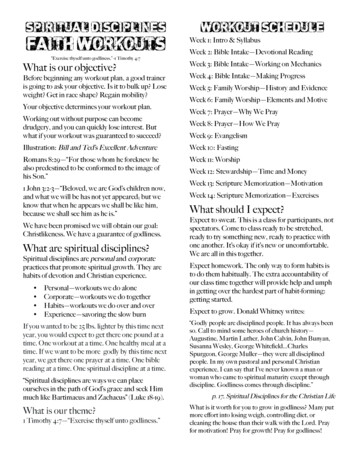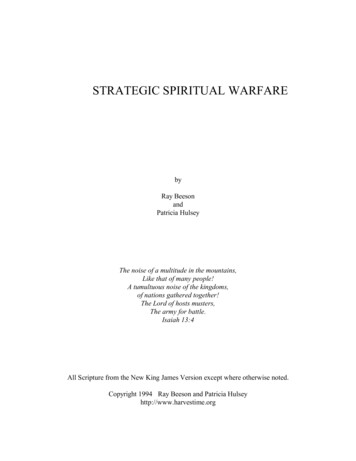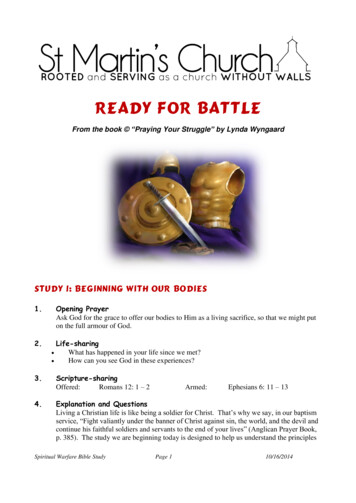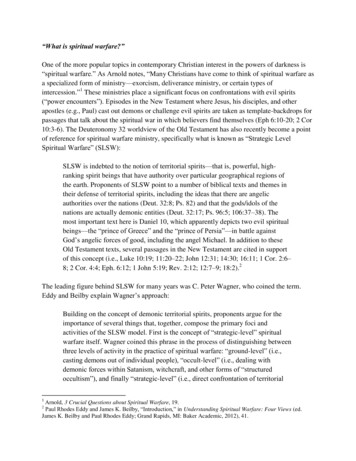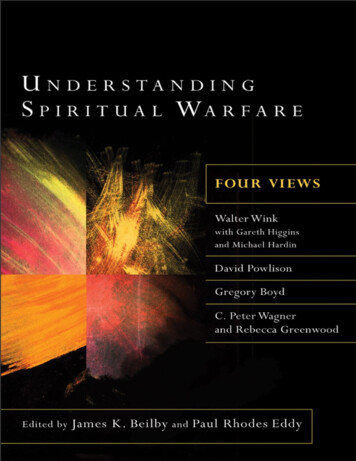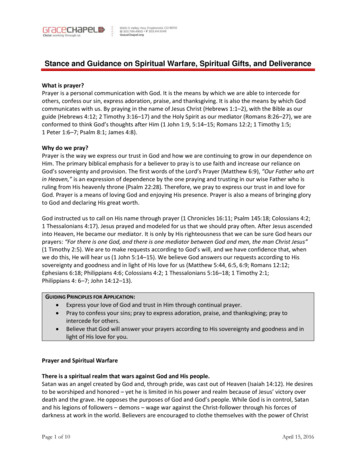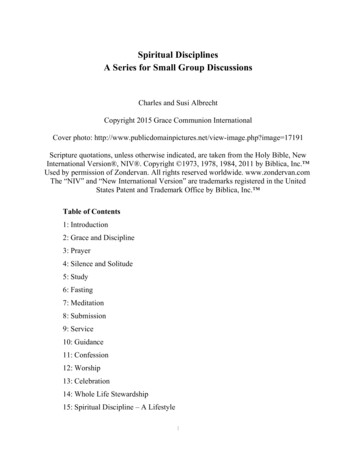
Transcription
Spiritual DisciplinesA Series for Small Group DiscussionsCharles and Susi AlbrechtCopyright 2015 Grace Communion InternationalCover photo: ?image 17191Scripture quotations, unless otherwise indicated, are taken from the Holy Bible, NewInternational Version , NIV . Copyright 1973, 1978, 1984, 2011 by Biblica, Inc. Used by permission of Zondervan. All rights reserved worldwide. www.zondervan.comThe “NIV” and “New International Version” are trademarks registered in the UnitedStates Patent and Trademark Office by Biblica, Inc. Table of Contents1: Introduction2: Grace and Discipline3: Prayer4: Silence and Solitude5: Study6: Fasting7: Meditation8: Submission9: Service10: Guidance11: Confession12: Worship13: Celebration14: Whole Life Stewardship15: Spiritual Discipline – A Lifestyle1
About the Authors About the Publisher Grace Communion Seminary2
1: IntroductionOur loving God wants us to live a fulfilled life. Although he does not guarantee usa trouble-free existence, he does give instructions that strengthen our bond with him.God’s purpose is to develop a loving relationship with each one of his children. Onepowerful way to know our Lord better is through the spiritual disciplines.Spiritual disciplines can be described as behaviors that facilitate spiritualgrowth. The process of spiritual growth and development begins to take place when aperson encounters God, and God begins to create a new level of consciousness orawareness. When we pursue each day as an exciting opportunity to develop a lovingrelationship with God, these disciplines will guide us to see our Father’s heart moreclearly.Think of someone you have viewed as a mentor, or someone you have respectedin the past. What characteristics caused you to think of this person?In what ways do you want to be like this person? Why?Some of us may have asked, “What are Christians expected to do on a day-to-daybasis?” What would make us ask such a question?Key Scripture: John 14:5-15In verse 7, we read, “If you really know me, you will know my Father as well.”Why does Jesus respond to Thomas in this way?What implications does this response have for us as Christians today? (Galatians2:20)What did Jesus mean when He said that those who believe Him will do even3
greater things? (verse 12)What might a nonbeliever see in a Christian that would help the nonbeliever toknow Jesus or the Father?What are some of the activities in which Jesus regularly participated? (Theseactivities Willard refers to as “disciplines.”)As a group, pray that God will lead the group in the coming discussions on thedisciplines.Almost 2,000 years later, can we truly follow Jesus Christ’s life-model, or is itsimply impossible in today’s hectic world?Challenge for growthMeditation and prayer:In the coming weeks, meditate on the importance of the spiritual disciplines inyour life.How have spiritual disciplines changed your life? How would you like them to4
change your life? Petition God in prayer and thanksgiving to help you.For further studyIn your personal Bible study, take special notice of God’s instruction on thedifferent disciplines.— The Spirit of the Disciplines, Dallas Willard— Celebration of Discipline, Richard FosterCharles and Susi Albrecht5
2: Grace and DisciplineChristians live in grace and by grace, not by works. We cannot boast about ourown works, no matter how good they are. God gets all the glory, for he is the one whomotivates us to do anything good. Even the faith we have is a gift of God.So, to ensure that God gets all the glory, should we sit back and do nothing?Should we not study unless God motivates us to feel like it, should we not pray unless hemotivates us to feel like it, should we not do any good works unless he initiates them?Does any talk of discipline take the initiative away from God, give people opportunity toboast, and become a form of legalism?Is discipline an enemy of grace? If it’s all of grace, what need is there for anydiscipline? If God does the work, why should we try?Parents: have you ever taught a child to do something by doing it with the child –so much so that you were actually doing all the work and the child was just followingalong? Did you want the child to try, or to quit trying? Give an example.In 1 Corinthians 15:10, Paul tells us, “By the grace of God I am what I am, and hisgrace toward me was not without effect. No, I worked harder than all of them – yet not I,but the grace of God that was with me.” Who was doing the working – was it God, orwas it Paul? What characteristic of God did Paul say was working in him?Key Scripture: Romans 12:1-8 (NIV)After Paul has explained to the Romans that salvation is by grace through faith in6
Jesus Christ as our atoning sacrifice, he now begins to stress some practical applications.Does he exhort us to be passive, to wait upon the Lord for him to work in us? Verses 1-2.How might Paul respond if we asked him: “You tell us to be transformed by therenewing of our minds. How do we go about that?” Is that something we do, or do wewait for God to do it?Paul says that we are members not just of Jesus Christ, but also of one another –we belong to one another (verse 5). How might this affect our behavior?Paul talks about spiritual gifts – given by grace – in verses 6-8. Do these gifts ofgrace do their own work in our lives, or is there something we are supposed to do withthem? Do our efforts take anything away from God’s glory?In Galatians 2:20, Paul said, “I no longer live, but Christ lives in me. The life I livein the body, I live by faith in the Son of God.” Who was doing the living – Paul, orChrist? (See 1 Corinthians 9:27 and Romans 15:18).In Colossians 1:29, Paul explained how he proclaimed Christ: “To this end I labor,struggling with all his energy, which so powerfully works in me.” Who was doing theworking in Paul’s life? Are we to strive for grace in the same way? How can we laborwithout taking any credit for it?John Piper says that God gives us faith, but yet it is still we who believe and trust.“It is unbiblical and irrational to say that, because the grace of God produces in us anactive trust in God, we don’t need to exert an active trust in God. Is it not irrational tosay, ‘God enables us to trust him; therefore we don’t need to trust 20-98.htm). How might this principle apply toworks?7
Challenges for growth:How can we work as hard as Paul did without being legalistic? Can we ask Godfor more zeal than we really want?If we don’t want that much zeal, why not? What is more important to us than zeal?Since we belong to one another, what is my responsibility toward you to help youin obeying Paul’s exhortations?Do we look on grace as a cover for wrong-doing, or as a motivation for rightdoing?Michael Morrison8
3: PrayerIntroductionPrayer changes us. Prayer changes lives. Prayer changes history. It is a way to feelGod’s heartbeat. Knowing who God really is makes us want to conform to Jesus Christand his way of life. God slowly and graciously reveals himself to us while we pray, and itis during those moments that we can breathe in deeply his love.What did James mean in James 4:3, “You ask and do not receive, because you askwrongly, to spend it on your passion”?To ask for the “right” things involves a changed heart, new passions. We think nolonger our own thoughts, but those of God’s; we desire the things God desires, we start tolove and care for the things God is concerned about; we realize that God’s will for meand others is far better than my own will. Our thoughts change, our hearts change, and welearn to see life from His point of view.The wonderful thing about prayer is that God meets us where we are. He comesalongside us to lead us into a deeper, more real relationship with him, not motivated byguilt, but driven by his love. In Matthew 6:9-13, the disciples, who may have prayed forsome time, asked Jesus to teach them to pray. Jesus did then, and does now, teach us topray. We can become his students in prayer today, and there is no need for anyone to feelthey need to understand it all better before they can start. Instead, we can look forward toa life-long process.Key Scripture: Matthew 6: 9-13Our Father in heaven, hallowed be your name, your kingdom come, your will bedone on earth as it is in heaven. Give us today our daily bread. Forgive us our debts, aswe also have forgiven our debtors. And lead us not into temptation, but deliver us fromthe evil one.9
(You might want to recite the Lord’s Prayer together as a group.)As a child, did somebody teach you to pray, or give you a model prayer? Do youremember what you prayed for?Jesus taught us to come to the Father like little children. What are some of thecharacteristics that a child exhibits when talking to a loving parent? (Example: honesty,openness, imagination, etc.)When you pray, do you truly expect your prayers to be answered? Why or whynot?In 1 Thessalonians 5:16-18 we read, “Be joyful always; pray continually; givethanks in all circumstances, for this is God’s will for you in Christ Jesus.” A lack ofendurance is one of the greatest causes of defeat. What can we do to motivate ourselvesto stay disciplined, to endure in prayer, especially when it seems to us that God is notanswering?“One of the most critical aspects in learning to pray for others is to get in contactwith God so his life and power can flow through us into others” (Richard Foster). Howcan we “tune in” to God in order to pray more effectively for others?How do you listen to God? How does he communicate with you?“Answers to prayer are wonderful, but they are secondary to the main function ofprayer, which is a growing, perpetual communion. It is out of this refreshing life ofcommunion with Jesus Christ that answered prayer comes as a happy by-product”(Richard Foster). How do you feel about this statement?10
Let’s pretend you are meeting a new Christian, who has been in the faith only afew days. She feels that prayer is mainly intense and difficult, even frightening. Howwould you assure her to continue to pray?How would you respond to someone who makes the following statement: “Godknows the end from the beginning, he knows what’s best for everyone, so why should Ibother to pray? I’m afraid I might pray for the wrong thing.”Do you think it is important to view prayer as a learning process? Why?Challenge for growthWhat should we do when we don’t feel like praying? Give it some serious thought.Try to find ways to discipline yourself to pray anyway, not out of guilt, but motivated byyour love for God.Here is a little experiment for you: Go through a whole day offering a silent prayerfor every person you come in contact with. Record what you have learned from thatexperience.Many people around us do not know the Lord. Make a list and start praying for thepeople you know who need to know that God loves them. How can you share God’s lovewith them?Spend more time in prayer of praise, worship and thanksgiving.S. Albrecht11
12
4: Silence and SolitudeIntroductionIn today’s world a wide range of impulses bombards us. We have radios in ourhomes, in our offices, and in our cars. Our homes have access to scores of televisionchannels and videos. There are games and computers and the internet. There are moremagazines, newspapers and books than we could ever read. People, sounds and things areeverywhere we go.Dr. Richard Peace writes, “The spiritual disciplines keep us alert to the presence ofGod.” He continued that “the spiritual disciplines are a way of learning to hear again; away to respond positively to God.” Does it seem that God has been pushed out by thesensory overload from our surroundings?Where do you go, or, what do you do to unwind when you have had one of thosehectic days? Why do you find this to be of comfort?Scriptural theme: Luke 5:15-16; 6:12-13Consider three or four of the following discussion items regarding the scripturaltheme and the disciplines of silence and solitude:Why are references like these recorded in the Gospels?Do you think Jesus was strengthened by his time on the mountain? If so, how?Do people in today’s world find it difficult to find “quiet time?” What are thingsthat can either hinder or encourage this type of quality time?It is said that solitude is a fundamental discipline. Can something really be learnedfrom spending time alone, from taking time in silence and solitude?13
According to Richard Foster, “Loneliness is inner emptiness. Solitude is innerfulfillment, [and it] is more a state of mind and heart than it is a place.” What are yourthoughts on this perspective?As individuals, take a few quiet minutes during the meeting to reread the themepassages silently. What is God saying to you in these passages?Sometimes people will withdraw from their normal surroundings when searchingfor a quiet place. How can this be beneficial?Challenge for growthDuring your prayers, spend some time in silence to focus on God’s nature andwhat he may be saying to you.In the coming weeks, schedule a period of time away from all the distractions inyour daily life. Schedule a time of solitude.Pray that God will lead you as you practice the disciplines of silence and solitude.We have outlined two popular lists of disciplines as compiled by Dallas Willardand Richard Foster. The theme Discipline of Grace has been the focus of other authors,and has also been included in our series.14
Charles Albrecht15
5: StudyIn the spiritual discipline of study, we engage ourselves, above all, with the writtenand spoken Word of God. In Romans 12:2, the apostle Paul tells us that we aretransformed through the renewal of the mind, and that we cannot just simply copy thebehavior of those around us. The discipline of study is an important vehicle by which ourminds are renewed by those things that are important to God. Study will help to releaseus from the bondage of fear and anxieties, and replace that with the knowledge of God’sgrace, which will reach the depth of our hearts, minds and souls.Jesus said in John 8:32, “You will know the truth, and the truth will make youfree.” Without the truth, we will not be truly free. As we all know, this principle appliesto every area, whether we study biology, mathematics or science. But it is especially truein reference to our spiritual walk. In this discussion, we want to focus on our study ofspiritual issues.As we learn from each other, we will be able to identify pitfalls, joys andchallenges. The goal is to more fully experience the liberation that study brings.Key Scripture: Philippians 4:8“Finally, brothers and sisters, whatever is true, whatever is noble, whatever isright, whatever is pure, whatever is lovely, whatever is admirable—if anything isexcellent or praiseworthy—think about such things.”What is your favorite time of the day? When do you feel most energetic, alive andable to concentrate?In your own words, describe what “study” means to you, and what it does notmean.In 1 Timothy 4:7 we read, “Don’t waste time arguing over foolish ideas and sillymyths and legends. Spend your time and energy in the exercise of keeping spiritually fit”(The Living Bible). Studying the right things is as important as studying in general. How16
do you determine what the right things for you to study are?Outside the Bible, what book, teacher, lecture, etc. have had the most profoundimpact on your spiritual life?Have you ever had the experience that after careful, analytical, serious study youchanged your actions, opinion or even life style? Please share an example with the group.Why does study produce joy?Do you think our study affects those around us? How?In the Old Testament, the Israelites were instructed to write the laws on gates anddoorposts and bind them to their wrists so that “they shall be as frontlets between youreyes” (Deuteronomy 11:18). The purpose of this instruction was to direct their mindsrepeatedly and regularly towards God, and his instructions on human relationships.Today, we no longer take part in that practice. But how can we discipline ourselves toregularly and repeatedly study God’s words to make it easier for his laws to be written inour hearts? What motivates you?We live hectic, busy lives, and we are often pulled in many different directions.How can we positively encourage one another in the discipline of study?PrayerAs a group, spend some time in prayer, asking God to direct and bless ourpersonal and collective study, so that we can know our Lord better and respond to him17
more fully.Ask God to help each member to prioritize his or her life, so we can makeadequate time to seek God through study.Thank God for allowing us to know him.Challenge for growthThe call to study – Proverbs 1:1-9: 23:12, 23.The source of truth – James 1:5; Hebrews 4:11-13; 2 Timothy 3:16-17.What to study – Philippians 4: 8-9; Colossians 3:1-17.The value of study – Luke 10:38-42.Active study – Ezra 7:10; James 1:19-25.S. AlbrechtMaterials used:Celebration of Discipline, Richard FosterThe Spirit of the Disciplines, Dallas WillardCommitting Ourselves to Be Changed by God, Foundation of Christian Living18
6: FastingIntroductionIf you seek a closer walk with God, consider fasting. Throughout Scripture, fastingrefers to abstaining from food, or food and drink, for spiritual purposes. Fasting is morethan a diet adjustment; it involves spiritual intensity and intercession. Fasting shouldalways be accompanied with prayer, meditation, and Bible study.We should never be motivated by the mistaken idea that our fasting will moveGod to do what we want. Even if we wanted to, we could never manipulate God. Thepurpose of our fasting is to move us closer to God and to seek his will in our lives.One of the greatest spiritual benefits of fasting is becoming more aware of ourown inadequacies and God’s adequacy; becoming more aware of our own failings and hisself-sufficiency. The purpose of all disciplines, including fasting, is to change us so thatwe may become more Christ-like. Fasting helps us to listen to what God wants us to beand do.The list of biblical personages who fasted reads like a Who’s Who of Scripture.For example: Moses the lawgiver, David the king, Elijah the prophet, Esther the queen,Daniel the advisor to kings, Anna the prophetess, Paul the apostle, and Jesus Christ theincarnate Son.A word of caution: Before anyone attempts to go on a fast, please consult yourphysician if you have health problems such as diabetes, kidney disorders, or other seriousconditions. The normal spiritual fast is going without food for a period of time duringwhich you ingest only liquids (water and/or juice). The duration can be one day or severaldays. Some Christians fast on juice or water up to a week. The absolute fast is abstainingfrom both food and water. The duration shouldn’t exceed one or two days unless youhave discussed absolute fasting ahead of time with your doctor.19
1st key passage: Matthew 6:16-18Does Jesus command fasting, or does he only comment on how to fast properly?What should we do and how should we look when fasting? Why?One key to fasting is motivation. What are the differences in motivation betweentruly seeking God and fasting to gain power or admiration?2nd key passage: Matthew 9:14-15Did Jesus expect his disciples to fast after he was gone?It is said that fasting brings us closer to God. Could this be one of the reasonsJesus said his disciples would fast after he would no longer be with them? What are otherreasons?3rd key passage: Isaiah 58:3-10In this passage, Isaiah tells us that the Jews were fasting, but God was notanswering their requests. Why not? What kind of fast does God want?When people turn from mistreating others, to helping them with their needs, doesthat in itself count as fasting? Are we to obey when we fast, obey before we fast, or obeyinstead of fasting?Is fasting a way to get God to answer our prayers? Will fasting solve our20
problems? Will it lead to more effective evangelism? Does it solve humanitarianproblems? What does God promise to do if his people fast in the right way? Will we gainpower over sin?Some may wish to share how God has answered their prayers when they werefasting for his intervention.21
When we fast and pour our heart out to God, it’s been said that he gives us His“eyes” to see the situation or the problem as it really exists. How is this beneficial to us?During the fast, why is it helpful to read various portions of Scripture that mayapply to our situation and then meditate on them?Challenge for growthThe next time you feel the need to fast for any spiritual reason, please considerthese benefits that fasting produces: 1) spiritual examination and introspection; 2)spiritual confession; 3) spiritual intercession. In what way does fasting help us pray forothers?22
7: MeditationIntroductionWhen considering meditation, some people think of images such as incense,candles, dark rooms filled with people sitting cross-legged on the floor humming“Ommmm.” There are many forms of meditation, which is part of almost every form ofreligion. However, Christian meditation can be virtually the opposite of Easternmeditation.Christian meditation is listening, sensing, and heeding the life and light of JesusChrist. Richard Foster puts it this way:In the discipline of meditation we are not so much acting as we are openingourselves to be acted upon. We invite the Holy Spirit to come and work within us –teaching, cleansing, comforting, and rebuking. We also surround ourselves with thestrong light of Christ to protect us from any influences not of God.Meditation gives us the wondrous and glorious opportunity to dwell completely onthe goodness and perfection of our Lord. He wants you and me to be in communion withhim so that we can learn his will, realize his purpose, believe his promises, see his workand imitate his way for us.In the last one or two weeks, what are some steps you were able to take inapplying what we have learned from the spiritual disciplines?What are the first images that come to your mind when you think of meditation?Do you feel comfortable and confident to meditate? Do you ever feel thatmeditation is too difficult, complicated or weird? Why?In the midst of a very busy ministry Jesus made it a habit to withdraw many timesto be alone (see Matthew 4: 1-11; 14:23; Mark 1:35; 6:31; Luke 6:12, etc.). As youmeditate on one of these scriptures, please share with the group what you think Jesus didduring those important times.23
From your experience, what is the purpose for meditating on God’s Word? Howdo you think obedience is related to this topic? Please read what Jesus said in John 5:19and 30.In your opinion, are people around us affected when we make time for thediscipline of meditation? Why or why not?Meditation as a groupFacilitator: You may wish to choose different scriptures. The following is just asuggestion.God greatly desires to spend time alone with us. After all, we are his children.Please read John 1:12 and Galatians 3:26. Our heavenly Father wants to know us, and hewants us to know him. Think about this: The Creator of the universe wants to meet withus alone daily.What do you and God do when you are alone together?To be in the presence of God is to change. How is God changing you when youare in his presence?Do you feel like a child of God?You are not who you are because of your own or others’ opinions. You are whoyou are because of what God says about you. In 1 Peter 1:24-25 we read, “Our naturallives will fade as grass does when it becomes all brown and dry. All our greatness is likea flower that droops and falls, but the Word of the Lord will last forever.”Based on the above verses, why do you think it is important to see yourself fromGod’s perspective rather than the world’s?24
How does meditating on God’s words change your self-image?How is it molding your view of others?Challenge for growthAs you sit down to read the Bible and spend time with God in prayer andmeditation, picture Jesus sitting next to you in your living room. Imagine he turns to youand asks you: “I love you so much. Tell me what I can do for you today.” Then tell himexactly what is in your heart – your desires, hopes, needs, fears, and joys.When you have finished, turn now to Jesus and ask him the same question: “Jesus,I love you so much. Please tell me what I can do for you today.” As you become quiet,listen to what God is saying to you. God wants us to live out our spiritual journey in theordinary events of our daily lives.This is an example of how to meditate. God will give us many other ways to enterinto a fuller life with Him through meditation.S. and C. AlbrechtMaterials usedCelebration of Discipline – Richard FosterThe Spirit of the Disciplines – Dallas WillardExperiencing the Word in Your Life – Priorities for LivingExperiencing God – Henry T. Blackaby & Claude V. King25
8: SubmissionIntroductionAs we examine and learn about the life of Jesus Christ, we see that his willingnessto serve had roots in his confidence that God loved him. Jesus found strength andassurance in knowing how important he was to his Father. This knowledge of his Father’slove enabled Jesus to serve people and ultimately demonstrate the greatest form ofsubmission – his death on the cross. The cross has since become the symbol of bothsubmission and freedom to Christians around the world.Throughout the Bible God teaches us about submission, yet there are manymisconceptions about this topic. Some feel that this discipline is mainly reserved formarried couples and children, or people of lesser rank or status. Also, a deficient teachingand understanding on the topic of submission has manipulated, suppressed and evendestroyed many people throughout the world.The discipline of submission, and its consequence of freedom, is for all Christians.Submission is about our recognition that we need God, our realistic evaluation of ourabilities, and our humble willingness to serve.Please read 1 Peter 5:5-7What comes to mind when you hear the word “submission”?In your own words, what does submission mean? (Attitudes, actions, etc.) What issubmission not?What value does our society place on submission? How is God’s view different?We read in verses 6 and 7: “If you will humble yourselves under the mighty handof God, in his good time he will lift you up. Let him have all your worries and cares, forhe is always thinking about you and watching everything that concerns you.”How does submission to God bring us freedom? Have you thought about this26
concept before, that is, that submission is a way to freedom? Read John 8 30-36.Please read Philippians 2: 1-11After carefully reading the above passage, how has Jesus exemplified submissionand humility?In verse 3 we read: “Don’t be selfish; don’t live to make a good impression onothers. Be humble, thinking of others as better than yourself.” (The Living Bible)Why do we tend to value and desire praise from our peers more than recognitionand praise from God?How can we keep a balance between cultivating a submissive, humble attitude,and recognizing our priceless value in God’s sight? Why is it important to keep thatbalance?Ephesians 5:21 says simply: “Honor Christ by submitting to each other.” How doyou plan to demonstrate a healthy spirit of submission this week in your relationshipswith others?27
Challenge for growthConsider your relationship with God. Are there areas in your life that you have notyet submitted to God?Do you recognize your need for God, especially in areas where you aresuccessful? If so, thank God for it. If not, ask God to give you a greater awareness ofyour need for him in your life.Think of your strengths and weaknesses. You might want to list ten of each on apiece of paper. How are you using your strengths to serve God? How are you planning todevelop strength from your weaknesses?Think of ways, places, or opportunities you would like to serve. Take a stepforward this week and consider serving in one of these areas.Consider further study on submission, as there are many more aspects andscriptures dealing with this topic.S. AlbrechtMaterials used:The Spirit of the Disciplines – Dallas WillardCelebration of Discipline – Richard FosterThe Living BibleThe Busy Christian’s Guide to Experiencing God More – William Watkins28
9: ServiceIntroductionWhen we think about the spiritual disciplines, the discipline of service may be theeasiest for us to visualize. In spite of this fact, the spirit of service can often go withoutenough consideration. The spiritual value in acts of service is very important forChristians to contemplate and understand, as it, in part, reveals the individual’s heart andlife.Let’s discuss the profound example of service that Jesus gave us.Theme passage: Mark 10:35-45When you go into a store or restaurant, what is a sign of “good service”?What does it mean when we instruct someone to “practice what you preach”?After reading the theme passage, why does Jesus use a servant to demonstrate aperson considered to be worthy of greatness? How do you think this also describes agreat person in our society?Why does God link the themes of service and leadership, and how do you seethem relate?29
Although the disciples did not want Jesus to wash their feet, he did it as a physicalsign of service. How does Jesus serve us in our daily lives? Are there motivations inservice that lessen or damage the service itself?Sometimes it is easier to serve people we know rather than strangers or peoplewith whom we do not feel comfortable. Why is that?In verse 45 of Mark 10 we see the clearest statement regarding the saving grace ofthe Messiahship of Jesus. Why do you think this reference occurs in a passage instructing30
us to be a servant?Challenge for growthAs a group, plan a special community service project for the coming month. Asyou approach the proj
— Celebration of Discipline, Richard Foster Charles and Susi Albrecht 5. 2: Grace and Discipline Christians live in grace and by grace, not by works. We cannot boast about our own works, no matter how good they are. God gets all the glory, for he is the one who motivates us to d



